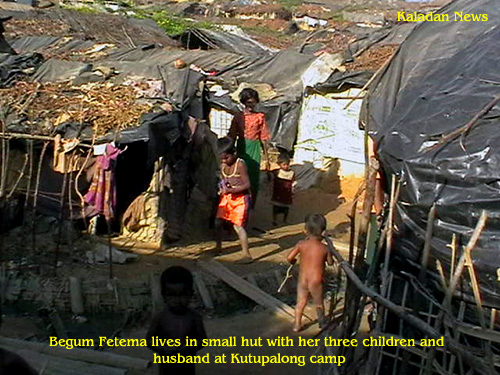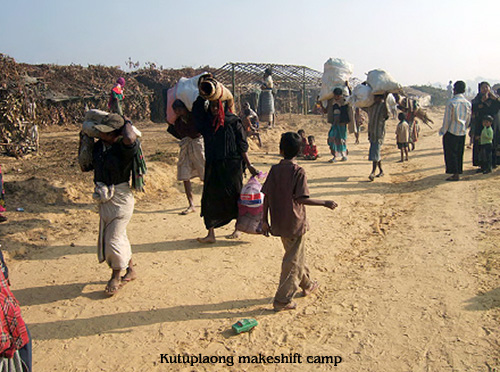Begum Fatema was five years old when she and her family left her home in Arakan State and fled to Bangladesh 15 years ago because of brutal treatment by the Burmese Military...
Begum Fatema was five years old when she and her family left her home in Arakan State and fled to Bangladesh 15 years ago because of brutal treatment by the Burmese Military.
 “I along with my family members came to Bangladesh when I was five years old because of many human rights abuses,” she told Kaladan News in an interview.
“I along with my family members came to Bangladesh when I was five years old because of many human rights abuses,” she told Kaladan News in an interview.
In 1993, her family members illegally crossed the Burma-Bangladesh border at night by row boat from Shapuri Dip, under the Teknaf police station.
After her arrival, the family lived in a rented house in Cox’s Bazar for nearly five years. Then, her family members went to Betsara of Bandarban, from Cox’s Bazar, because there was opportunity for Rohingya people to work at farming, fishing and collecting firewood.
She married a Rohingya a young Rohingya man named Mohamed Younus, in 2002, at Bandarban district.
They lived at Betsara, in Bandarban district, for seven years after getting married.
They have two sons, 8 and 6 years old and a 4 year old daughter. Her husband worked as a daily laborer.
However, at the end of 2009 an Army officer told the Rohingya people who lived in the area the Bangladeshi authorities may conduct raids in the area where they live.
There were around 36 houses in the area of Batsara. The people there had to work to feed themselves and their children because they do not qualify for any form of aid, Begum said.
Early the next day, police arrived and arrested 36 Rohingyas, including Begum and her children.
Her husband was not there at the time of the raid, having been tipped off by an army officer.
During the raid a police asked her, “Where is your husband?”
She told him her husband went to work but he did not return that night.
She and her small children were dragged out of the house by police, leaving all their possessions behind. She said it was very cold at that time.
“We left our clothes, rice, the hens- everything.”
“Everything was taken by local Bangladeshi residents.”
When she protested, she was beaten by police.
Begum said the prisoners were put in a boat at 8:00 a.m. for the 5 hour trip to the police station at Bandarban.
However, they were not provided any food during the journey.
“When the small children were crying for food, a police officer told us not to feed them or give them water,” she said.
“Officer said, ‘kill them.’”
However, a Bangladeshi officer provided some cakes for the children himself when they arrived at the police station.
Later, she and the other prisoners were put on a bus bound for Naikonchari, a town on the Burmese border, which is the base for Batallion 15 of the Border Guard of Bangladesh (BGB). It is responsible for forcing refugees back into Burma.
From Naikoncahari, they were brought to the border where the BGB did provide them with a little water and some cakes before returning to their headquarters.
“The BGB released us at the border without handing us over to the Nasaka, the Burmese border guard force,” Fatema remembered.
“We feared that if we should meet Nasaka personnel, they would shoot us.”
So, the Rohingya prisoners decided not to cross the border into Burma, staying inside Bangladesh without the knowledge of the Bangladeshi authorities.
When Begum’s children became very weak and unconscious in the cold, she entered a house at Sacc Dala, at Naikonchari and made fire that night to warm the children.
The next day, she called her husband. He came to Sacc Dala and gave 5,000 taka to the owner of the house to pay for providing shelter.
Then she and the children went to Kutupalong unofficial makeshift camp with her husband.
Now, she and her husband and the three children live in a small hut at Kutupalong in miserable conditions.
Like Begum, many Rohingya people were arrested and pushed back to Burma by the Bangladeshi authorities since that time.
Amina Khatun, wife of Abdu Zabar, was also pushed back into Burma along with five family members. Her elder deaf son was severally beaten by Bangladeshi police.
But, Amina also came back to Bangladesh from Burma’s border without knowledge of the Bangladeshi authorities.
 The Arakan Project says in a report an unprecedented crackdown by Bangladesh law enforcement agencies against unregistered Rohingya refugees who had settled outside the two official refugee camps in Cox’s Bazar District started on 2 January 2010. More than 500 Rohingyas were subsequently arrested in January and the crackdown continues. Some of those arrested were pushed back across the Burmese border and others were charged under immigration legislation and sent to jail. Also, there is a resurgence of anti-Rohingya movements among the local population and of anti-Rohingya propaganda in the local media fuelling xenophobia and pressing the government to take action against the Rohingya. A similar campaign started earlier in 2009 in Bandarban District and is still ongoing.
The Arakan Project says in a report an unprecedented crackdown by Bangladesh law enforcement agencies against unregistered Rohingya refugees who had settled outside the two official refugee camps in Cox’s Bazar District started on 2 January 2010. More than 500 Rohingyas were subsequently arrested in January and the crackdown continues. Some of those arrested were pushed back across the Burmese border and others were charged under immigration legislation and sent to jail. Also, there is a resurgence of anti-Rohingya movements among the local population and of anti-Rohingya propaganda in the local media fuelling xenophobia and pressing the government to take action against the Rohingya. A similar campaign started earlier in 2009 in Bandarban District and is still ongoing.
The report also says the makeshift camp residents, including uprooted families, do not receive food assistance and are now denied access to livelihood as they would face arrest if they left the camp to find work. Food insecurity and hunger is spreading rapidly and a serious humanitarian crisis is looming.
A report by MSF says a violent crackdown against stateless Rohingya in Bangladesh is forcing thousands of people to flee in fear. Driven from their homes throughout Cox’s Bazaar district by local authorities and citizens, many have sought refuge at Kutupalong (unofficial) makeshift camp. Here, medical organization, Médecins Sans Frontières (MSF), is treating victims of beatings and harassment, including people the Bangladeshi Border Force has attempted to forcibly repatriate to Myanmar. As camp numbers continue to swell, conditions pose a significant risk to people’s health.
In a report released 18th February, 2010, MSF calls for an immediate end to the violence, along with urgent measures by the Government of Bangladesh and the United Nations High Commission for Refugees (UNHCR) to increase protection of Rohingyas seeking asylum in the country.
Recently about 18 Rohingya were arrested from various places along the Bangladesh-Burma border in raids by police and pushed back to Burma.
Begum Fatema is calling on the Bangladeshi government, as a Muslim country, not to push illegal Rohingya refugees back to Burma and provide them with shelter and official refugee status until democracy is established in Arakan State, Burma.



